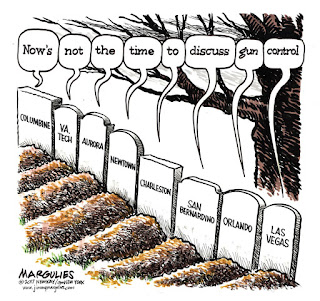 |
| Image Source: Cap Times, Amy Goodman, Dennis Moynihan related article |
Topics: Commentary, Politics, Research
"An armed society is a polite society. Manners are good when one may have to back up his acts with his life." Robert A. Heinlein
"The only thing that stops a bad guy with a gun is a good guy with a gun." NRA Executive Vice President Wayne LaPierre
On the night of October 1, 2017, a gunman opened fire on a large crowd of concertgoers at the Route 91 Harvest music festival on the Las Vegas Strip in the State of Nevada, leaving 58 people dead and 489 injured. Between 10:05 and 10:15 p.m. PDT, 64-year-old Stephen Paddock of Mesquite, Nevada, fired hundreds of rifle rounds from his suite on the 32nd floor of the nearby Mandalay Bay hotel. About an hour after Paddock fired his last shot, he was found dead in his room from a self-inflicted gunshot wound. His motive is unknown.
The incident is the deadliest mass shooting committed by an individual in the United States. The crime reignited the debate about gun laws in the U.S., with attention focused on bump firing, a technique Paddock used to allow his semi-automatic rifles to fire at a rate similar to that of a fully automatic weapon. Source: Wikipedia
- The claim that gun ownership stops crime is common in the U.S., and that belief drives laws that make it easy to own and keep firearms.
- But about 30 careful studies show more guns are linked to more crimes: murders, rapes, and others. Far less research shows that guns help.
- Interviews with people in heavily gun-owning towns show they are not as wedded to the crime defense idea as the gun lobby claims.
Guns took more than 36,000 U.S. lives in 2015, and this and other alarming statistics have led many to ask whether our nation would be better off with firearms in fewer hands. Yet gun advocates argue exactly the opposite: that murders, crimes and mass shootings happen because there aren't enough guns in enough places. Arming more people will make our country safer and more peaceful, they say, because criminals won't cause trouble if they know they are surrounded by gun-toting good guys.
Is there truth to this claim? An ideal experiment would be an interventional study in which scientists would track what happened for several years after guns were given to gun-free communities and everything else was kept the same. But alas, there are no gun-free U.S. communities, and the ethics of doing such a study are dubious. So instead scientists compare what happens to gun-toting people, in gun-dense regions, with what happens to people and places with few firearms. They also study whether crime victims are more or less likely to own guns than others, and they track what transpires when laws make it easier for people to carry guns or use them for self-defense.
Most of this research—and there have been several dozen peer-reviewed studies—punctures the idea that guns stop violence. In a 2015 study using data from the FBI and the Centers for Disease Control and Prevention, for example, researchers at Boston Children's Hospital and Harvard University reported that firearm assaults were 6.8 times more common in the states with the most guns versus those with the least. Also in 2015 a combined analysis of 15 different studies found that people who had access to firearms at home were nearly twice as likely to be murdered as people who did not.
This evidence has been slow to accumulate because of restrictions placed by Congress on one of the country's biggest injury research funders, the CDC. Since the mid-1990s the agency has been effectively blocked from supporting gun violence research. And the NRA and many gun owners have emphasized a small handful of studies that point the other way.
"For your hands are stained with blood, your fingers with guilt. Your lips have spoken falsely, and your tongue mutters wicked things." Isaiah 59:3
More Guns Do Not Stop More Crimes, Evidence Shows Melinda Wenner Moyer, Scientific American
Comments